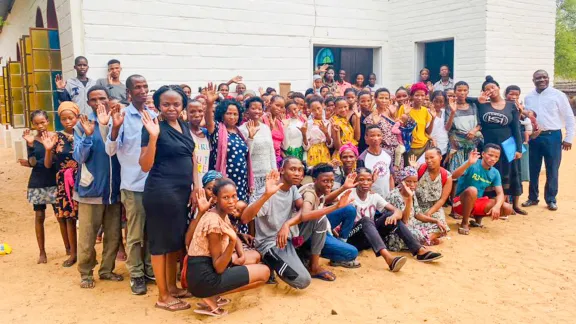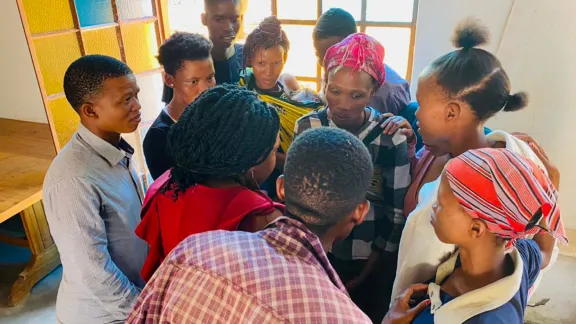In Namibia, a community of the San people and the Lutheran church are prioritizing indigenous-led development approaches to counter cultural stereotyping and economic marginalization.

Participants from the San community, at a training workshop organized by the Evangelical Lutheran Church in Namibia in the Mangeti Dune settlement. Photo: ELCIN
LWF supports “Pathways to Equality” and its focus on inner healing and emotional well-being
(LWI) – Often labelled as hunter gatherers whose lifestyles hinder development, a group of the San people in Namibia are confronting such stereotypes to affirm the positive contribution and resilience of their cultural identity.
In an initiative with the Evangelical Lutheran Church in Namibia (ELCIN), community representatives in Mangeti Dune, in the northeastern part of the country, have embarked on a project, "Pathways to Equality: Bushmen Youth, Livelihoods, and Economic Justice." The goal is to especially empower young people to be engaged in addressing the historic inequalities faced by the San people, also referred to as Bushmen. The Lutheran World Federation (LWF) provides support through its Diakonia and Development program.
Mangeti is a sparsely inhabited settlement in the arid region of Otjozondjupa. Displacement and land rights are pressing issues and increasingly complex for the youth, whose cultural and economic survival hinges on their ancestral lands, noted Ms Linda Chikerema, ELCIN project advisor. Sustainable progress therefore hinges on a holistic strategy that respects cultural identity while confronting issues such as historical marginalization, land conflicts, poverty, restricted access to educational and health services, discrimination, and economic instability.

Through “Pathways to Equality” youth gain skills on advocacy for land rights and establish the groundwork for long-term economic resilience. Photo: ELCIN
Centered on youth
Through “Pathways to Equality” youth gain skills on advocacy for land rights, improving livelihoods, community-led resource management, culturally aware development, and microenterprise growth that is centered on youth. The goal is to establish the groundwork for enduring economic resilience.
In April, the church conducted training sessions on entrepreneurship and life skills involving five youth groups. Each group received 10,000 Namibian dollars (around EUR 500) to engage in handcrafts, small livestock rearing and horticulture.
The project has been truly transformational, not only for the beneficiaries but also for us as the Lutheran church. We have learnt and continue to gather daily knowledge that we feel should benefit everyone
Ms Linda Chikerema, ELCIN project advisor
“The project has been truly transformational, not only for the beneficiaries but also for us as the Lutheran church. We have learnt and continue to gather daily knowledge that we feel should benefit everyone,” said Chikerema.
Addressing trauma
One of the objectives is to recognize the importance of addressing trauma and its link to developing new initiatives in a community. The aspect of labelling has been highlighted, “with many participants saying the term marginalized group was not empowering and subconsciously forced them to operate under that label,” Chikerema noted.
The ELCIN project advisor cited the story of Ms Rauna Kamati, a young woman who recently participated in a workshop on identity and labeling theory using the introspection and dialogue approach. This helped Kamati to “reclaim her narrative and resist the stereotypes imposed upon her community,” and embark “on a journey of embracing her cultural heritage” with newfound determination “to rewrite the story of her people on her own terms.”
Indigenous people’s rights
Mr Ashenafi Haile, LWF Program Executive for Diakonia and Development said “it is encouraging to see how the Nambian church is supporting the country’s indigenous population to investigate and document their own truth and reconciliation processes.” Referring to a Thirteenth Assembly resolution on Indigenous people’s rights, he noted the case of the San community in Mangeti Dune and an upcoming publication about the process will contribute to learning in the Lutheran communion and beyond.
ELCIN and the Mangeti Dune community are working on a publication that will document the cultural resurgence and adaptive strategies of the San people in Namibia. It will explore the challenges and opportunities in shaping their own development trajectories, advocate for indigenous-led development approaches that prioritize cultural integrity and community and empowerment, and foster knowledge-sharing between the church, indigenous communities, and academic institutions.


